Muled
type imitations of AD 330-340.
VRBS ROMA/wolf and twins, and
CONSTANTINOPLIS/Victory,
are official types. When the reverses are
unintentionally interchanged, the coins are "mules." The vast majority
of imitations from this time period combine the obverses and reverses
properly,
but occasionally a mule is found. Scholarly opinion is that these mules
were not intentionally officially issued, and certainly the numbers of
mules that are obvious imitations far exceeds the numbers of mules that
have any claim to possibly being official. One of the best such mules
is
next.
 AE14. 12:00. 1.70 grams.
AE14. 12:00. 1.70 grams.
This is a mule. Here the CONSTANTINOPOLIS obverse is combined with
the wolf-and-twins reverse proper to the VRBS ROMA obverse.
Good style and lettering, but an expert on the issue assures me this is
not the official style of Lugdunum, in spite of the PLG mintmark of
Lugdunum (see RIC page
140), so it is an imitation.
This coin was published in SAN XI.2 (1980) page 37 as potentially
official.
Subsequently Pierre Bastien saw it and told me he thought it was an
imitation.
Then this piece was cited in A Survey of Numismatic Research,
1978-1984,
page 288. The existence of offical mules of this period was the subject
of several articles in SAN (VI,1 (1974), pages 8 and 15; VI.3 (1975)
page
42; X.2 (1979) pages 20-21; X.4 (9179) page 60). After 20 years
studying
the matter, I think no mules of these types were intentionally issued,
but I do not rule out a simple mint error in some cases.
Bought from Malter, 1980.
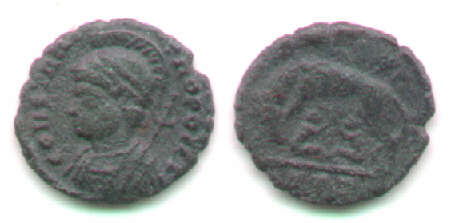 AE15. 7:00.
AE15. 7:00.
Another mule of excellent style, but lesser preservation.
TRP mintmark of Trier.
If official issues of this type, size, and mint existed, this would
be regarded as one.
Bought from Vosper, 1996.
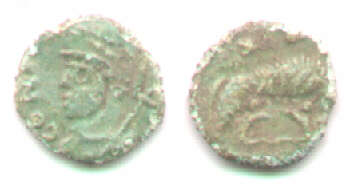 AE12. 5:30.
AE12. 5:30.
CON..../wolf and twins, no mintmark.
An obvious imitation.
Bought near Birmingham, 1996.
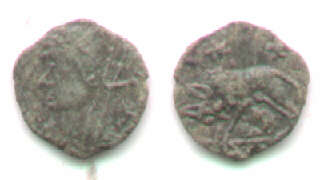 AE11. 12:00.
AE11. 12:00.
The busts of Roma and Constantinople are similar, but the sceptre over
the shoulder characterizes Constantinople. It serves to distinguish the
types when the legend is unclear.
VRBS ROMA/Victory imitation:
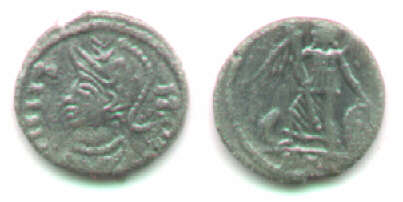 AE13. 8:00.
AE13. 8:00.
Blundered obverse legend, but likely VRBS ROMA was attempted.
An obvious imitation.
Bought in Cambridge, 1996.
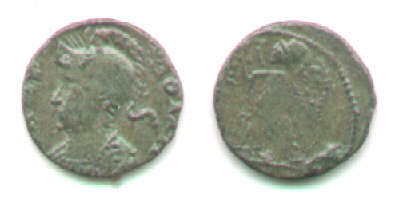 AE13. 6:00
AE13. 6:00
Weak strike. Mintmark, if any, off the flan.
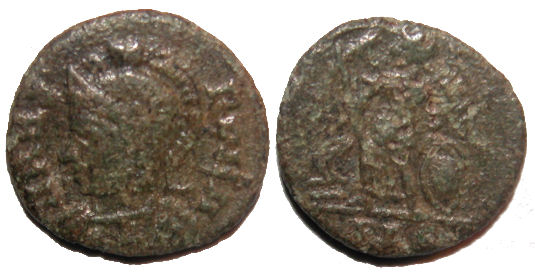
AE14-13. 6:00. 1.29 grams.
VRBS ROMA/Victory, PLG
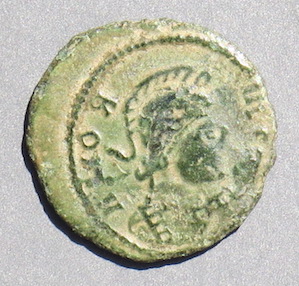
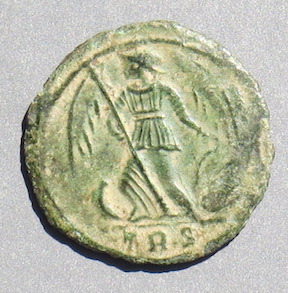
18 mm. 1.73 grams. 6:00
Beautiful and good style Victory reverse, but a crude VRBS ROMA obverse.
Bust right (usually it is left) in helmet with ROMA retrograde
and the rest blundered or doublestruck enough to be illegible. It must
be a contemporary imitation mixing the usual CONSTANTINOPOLIS reverse
with the usual VRBS ROMA obverse retrograde.
A "hybrid" or "mule" (the reverse does not belong paired with the
obverse) for types but its greatest interest is the style. The reverse Victory
looks official and very well-done. The obverse is the wrong type,
retrograde, and cartoonish. Remarkably inconsistent!
Other:
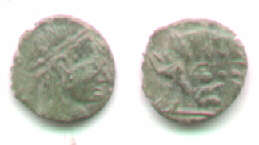 AE8 (tiny!). 5:00
AE8 (tiny!). 5:00
pearl-diademed head right/wolf and twins
Mintmark, if any, off the flan.
The head would be of Constatine or, more probably, one of his sons
Constantine II, Constans, or Constantius II.
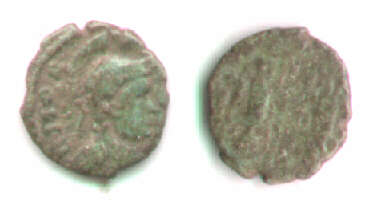 AE12. 12:00.
AE12. 12:00.
Very weak reverse.
VRBS ROMA type/two soldiers and two standards (the reverse is clear
on the coin, but not on the scan)
"AMOR" legend with "ROMA" retrograde. The entire head side is reversed.
No visible mintmark.
Imitators had no need, once the coins were so obviously irregular,
to pair the correct obverse and reverse types.
Bought in London, 1996.
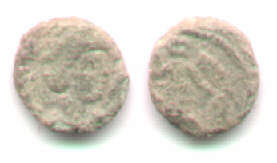 AE9. 6:00.
AE9. 6:00.
Tiny! Looks like Helena (or possibly
Theodora),
but definitely a female.
Bust right
/Victory left, as on the CONSTANTINOPOLIS pieces.
This is a major mismatch of types. It was found in the English midlands
in 1996 and has the typical English green patina/corrosion.
You have just finished page 4 of this subgroup.
Continue with the page on imitations
from AD 340-348.
Return to the page on GLORIA EXERCITVS
imitations
and official types of 330-340 (page 1 of this subgroup).
Return to the page on VRBS ROMA imitations
(page 2 of this subgroup).
Return to the page on CONSTANTINOPLIS
imitations
(page 3 of this subgroup).
Return to the main page on Roman imitations.
 AE14. 12:00. 1.70 grams.
AE14. 12:00. 1.70 grams.








